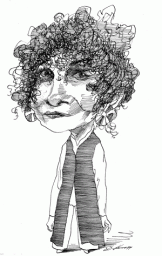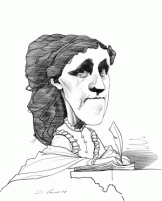
She Escaped to Become Original
‘The Invention of Angela Carter: A Biography’ by Edmund Gordon
The Invention of Angela Carter: A Biography
by Edmund Gordon
March 9, 2017 issue
Advertisement
More from the Review
Subscribe to our Newsletter
Best of The New York Review, plus books, events, and other items of interest
Alison Lurie is the Frederic J. Whiton Professor of American Literature Emerita at Cornell. She is the author of ten novels, two collections of essays on children’s literature, and the editor of The Oxford Book of Fairy Tales. Her most recent book is Reading for Fun. (March 2017)

She Escaped to Become Original
‘The Invention of Angela Carter: A Biography’ by Edmund Gordon
The Invention of Angela Carter: A Biography
by Edmund Gordon
March 9, 2017 issue

In the Air of Baxter’s Bridge
There’s Something I Want You to Do
by Charles Baxter
March 5, 2015 issue

The Triumph of Fay Weldon
Kehua!
by Fay Weldon
Praxis
by Fay Weldon
Down Among the Women
by Fay Weldon
Auto da Fay: A Memoir
by Fay Weldon
Splitting
by Fay Weldon
The Bulgari Connection
by Fay Weldon
She May Not Leave
by Fay Weldon
Long Live the King
by Fay Weldon
The New Countess
by Fay Weldon
March 20, 2014 issue

Who Is Peter Pan?
The many and varied manifestations of the boy who wouldn’t grow up
The Annotated Peter Pan
by J.M. Barrie, edited with an introduction and notes by Maria Tatar
April 5, 2012 issue
Do Schools Have to Be Boring?
School
by Catherine Burke and Ian Grosvenor
The Open Classroom: A Practical Guide to a New Way of Teaching
by Herbert R. Kohl
Social Design: Creating Buildings with People in Mind
by Robert Sommer
Big Box Reuse
by Julia Christensen
Small Wonder: The Little Red Schoolhouse in History and Memory
by Jonathan Zimmerman
Children's Spaces
edited by Mark Dudek
Nanny State: How Food Fascists, Teetotaling Do-Gooders, Priggish Moralists, and Other Boneheaded Bureaucrats Are Turning America into a Nation of Children
by David Harsanyi
December 18, 2008 issue
The Message of the Schoolroom
School
by Catherine Burke and Ian Grosvenor
Small Wonder: The Little Red Schoolhouse in History and Memory
by Jonathan Zimmerman
Teaching Boys and Girls Separately
an article by Elizabeth Weil
December 4, 2008 issue
The Girl in the Tower
Petrosinella: A Neapolitan Rapunzel
retold and illustrated by Diane Stanley
Golden: A Retelling of "Rapunzel"
by Cameron Dokey
Letters from Rapunzel
by Sara Lewis Holmes
Rapunzel
by Barbara Rogasky, illustrated by Trina Schart Hyman
Zel
by Donna Jo Napoli
The Tower Room
by Adèle Geras
Sugar Cane: A Caribbean Rapunzel
by Patricia Storace, illustrated by Raúl Colón
Rapunzel: A Groovy Fairy Tale
by Lynn Roberts, illustrated by David Roberts
Barbie as Rapunzel
by Merry North
May 1, 2008 issue

Pottery
Harry Potter and the Deathly Hallows
by J.K. Rowling
Harry Potter and the Order of the Phoenix
a film directed by David Yates, based on the book by J.K. Rowling
September 27, 2007 issue
When Is a Building Beautiful?
The Architecture of Happiness
by Alain de Botton
The Art of Travel
by Alain de Botton
The Consolations of Philosophy
by Alain de Botton
How Proust Can Change Your Life
by Alain de Botton
The Romantic Movement: Sex, Shopping and the Novel
by Alain de Botton
Household Gods: The British and Their Possessions
by Deborah Cohen
March 15, 2007 issue

The Lamp in the Mausoleum
The View from Castle Rock: Stories
by Alice Munro
Carried Away: A Selection of Stories
by Alice Munro, with an introduction by Margaret Atwood
Alice Munro: Writing Her Lives: A Biography
by Robert Thacker
Lives of Mothers and Daughters: Growing Up with Alice Munro
by Sheila Munro
December 21, 2006 issue
The Passion of C.S. Lewis
The Chronicles of Narnia: The Lion, the Witch and the Wardrobe
a film directed by Andrew Adamson
The Narnian: The Life and Imagination of C.S. Lewis
by Alan Jacobs
Revisiting Narnia: Fantasy, Myth and Religionin C.S. Lewis' Chronicles
edited by Shanna Caughey
February 9, 2006 issue

Liberated Girls
“In Little Women there are four heroines, all different and all imperfect. They struggle to become good, but like most human beings, they never completely succeed. The implication is that it is possible to have serious faults—vanity, anger, impatience, timidity, and selfishness—and still deserve happiness.”
Little Women, Little Men, Jo's Boys
by Louisa May Alcott
November 3, 2005 issue
Free calendar offer!
Subscribe now for immediate access to the latest issue and to browse the rich archive. You’ll save 50% and receive a free David Levine 2025 calendar.
Subscribe now
Give the gift they’ll open all year.
Save 65% off the regular rate and over 75% off the cover price and receive a free 2025 calendar!